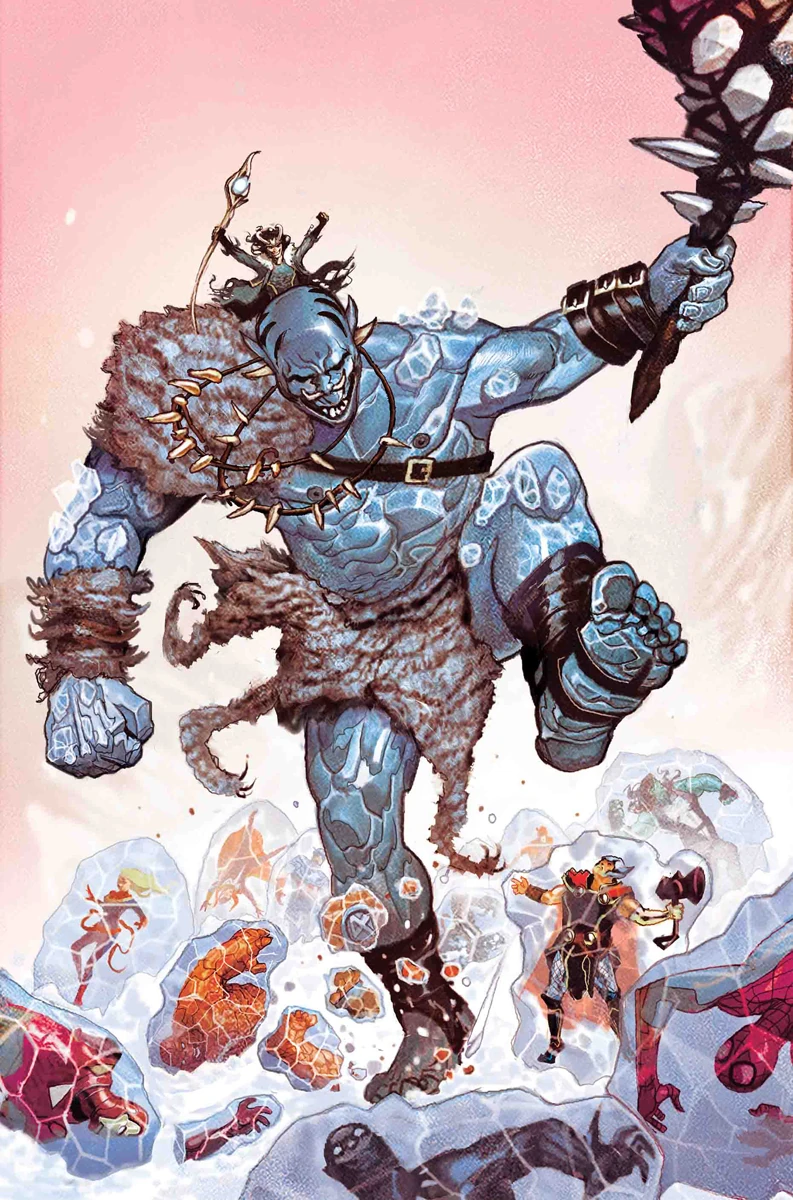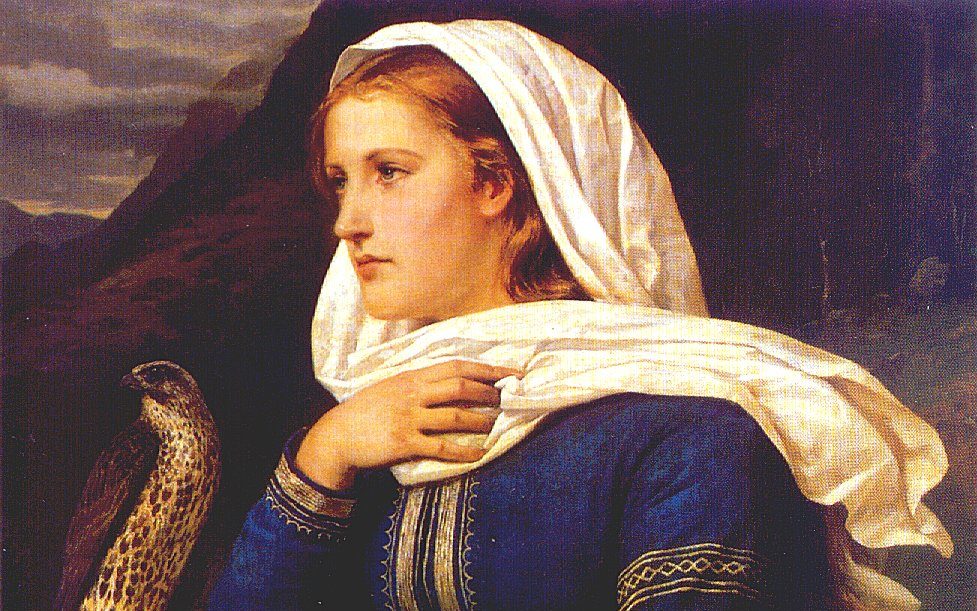Laufey Norse mythology is one of the most intriguing and lesser-known aspects of ancient Scandinavian tales. If you're diving into the world of gods, giants, and epic battles, you're in for a treat. This name might not ring a bell right away, but trust me, Laufey's story is as fascinating as it gets. So, buckle up, because we're about to uncover some seriously cool stuff about this legendary figure.
Now, when we talk about Norse mythology, the first names that pop into our heads are usually Thor, Odin, or Loki. But what about the characters behind these gods? That's where Laufey comes in. She’s a figure shrouded in mystery, and her connection to one of the most iconic tricksters in mythology makes her story all the more captivating. Let’s dive right in, shall we?
So, if you've ever wondered about the family ties in the world of Norse gods or just want to learn about a character who deserves more attention, you're in the right place. Laufey's tale is a mix of intrigue, power, and some serious mythological drama. Let’s break it down step by step.
Read also:Simon Helberg Height The Inside Scoop Youve Been Waiting For
Who is Laufey in Norse Mythology?
Let’s kick things off with the basics. Laufey, also known as Nál, is a fascinating character in Norse mythology. She's recognized as the mother of Loki, one of the most complex and influential figures in the mythological pantheon. But here's the thing—her story isn't as straightforward as you might expect. The sources about Laufey are sparse, which adds to the allure of her character.
Laufey’s name translates to "leafy island," which is an intriguing descriptor for a giantess in Norse lore. She is often associated with the frost giants, a race known for their strength and cunning. Some scholars suggest that her name might symbolize the balance between nature and chaos, reflecting her role as Loki's mother.
Laufey: The Enigmatic Mother of Loki
Now, let's zoom in on her most famous role—being the mother of Loki. Loki, as you might know, is the god of mischief and a central figure in many Norse myths. His actions often drive the plot in epic tales, from tricking the gods to aiding them in dire situations. But what about his mother? How does Laufey fit into this complex web of relationships?
The connection between Laufey and Loki adds layers to his character. While Loki is often seen as a figure of chaos, his mother’s identity as a giantess suggests deeper roots in the primal forces of the universe. This duality—being both a god and a giant—is central to Loki’s story, and Laufey plays a crucial role in defining it.
Biography and Data of Laufey
Let’s take a moment to organize the known information about Laufey in a neat table. This will help us get a clearer picture of her character and significance in Norse mythology.
| Name | Laufey (also known as Nál) |
|---|---|
| Role | Mother of Loki |
| Race | Frost Giant |
| Translation of Name | Leafy Island |
| Significance | Symbolizes the balance between nature and chaos |
Laufey’s Connection to Loki: A Deeper Dive
Alright, let’s talk about the big question—how exactly is Laufey connected to Loki? As mentioned earlier, she is his mother, but there's more to this relationship than meets the eye. Loki’s dual heritage—being both a god and a giant—shapes his identity and actions throughout Norse mythology.
Read also:Bane Dark Knight Rises Actor The Man Behind The Mask
Some myths suggest that Laufey’s influence on Loki might have contributed to his cunning nature. Giants in Norse lore are often depicted as wise and powerful, so it’s not a stretch to imagine that Loki inherited some of these traits from his mother. This connection highlights the complexity of Loki’s character and his place in the mythological world.
Understanding Loki’s Heritage
Loki’s heritage is a blend of divine and primal forces, and Laufey plays a key role in this mix. Her identity as a frost giant links Loki to the primal elements of the universe, while his interactions with the gods place him in the divine realm. This duality makes Loki one of the most intriguing characters in Norse mythology, and Laufey’s role in this equation is undeniable.
Think about it—Loki’s actions often challenge the boundaries between order and chaos, and his mother’s identity as a giantess might just explain why he’s so comfortable straddling these lines. Laufey’s influence, though subtle, is a crucial part of Loki’s story.
The Role of Giants in Norse Mythology
To fully understand Laufey’s significance, we need to explore the role of giants in Norse mythology. Giants, or jötnar, are a race of powerful beings who often oppose the gods. However, their interactions with the divine realm are complex and multifaceted. Some giants are enemies of the gods, while others form alliances or even relationships with them.
Laufey’s identity as a frost giant places her in this intricate web of relationships. Her connection to Loki highlights the blurred lines between gods and giants, suggesting that these two races are more interconnected than they might seem. This complexity adds depth to the mythological world and makes Laufey’s story all the more intriguing.
Laufey vs. Farbauti: The Debate
Here’s where things get interesting. In some sources, Loki’s mother is referred to as Laufey, while in others, his father is named Farbauti. This has led to a debate among scholars about the true identity of Loki’s parents. Some suggest that Laufey and Farbauti might be the same figure, while others argue that they are distinct individuals.
Regardless of the interpretation, Laufey’s role as Loki’s mother remains central to his story. Her identity as a frost giant adds layers to Loki’s character, emphasizing the duality that defines him. This debate only adds to the mystery surrounding Laufey and her place in Norse mythology.
Laufey in Modern Interpretations
Now, let’s shift gears and talk about how Laufey is portrayed in modern interpretations of Norse mythology. With the rise of Marvel’s Loki and other adaptations, Laufey’s story has gained new attention. While the character isn’t always explicitly mentioned, her influence can be felt in the portrayal of Loki and his origins.
In Marvel’s version, Loki’s connection to the giants is a central theme, and while Laufey isn’t directly named, her role as Loki’s mother is implied. This modern take on Norse mythology brings Laufey’s story to a wider audience, sparking interest in her character and her place in the mythological world.
Laufey’s Legacy in Popular Culture
Laufey’s legacy extends beyond traditional myths and into popular culture. Her influence can be seen in various adaptations, where her role as Loki’s mother shapes the narrative. While her character might not always be explicitly mentioned, her significance in defining Loki’s identity is undeniable.
Think about it—without Laufey, Loki’s story wouldn’t be as rich or complex. Her identity as a frost giant adds depth to his character, making him one of the most fascinating figures in both ancient and modern lore. This legacy ensures that Laufey’s story continues to captivate audiences worldwide.
Key Themes in Laufey’s Story
Laufey’s story is rich with themes that resonate across cultures and time periods. One of the most prominent themes is the balance between order and chaos. As a frost giant and the mother of Loki, Laufey represents the primal forces that shape the universe. Her connection to Loki highlights the duality that defines his character and his place in the mythological world.
Another key theme is the interconnectedness of gods and giants. Laufey’s role as Loki’s mother blurs the lines between these two races, suggesting that they are more intertwined than they might seem. This theme adds depth to the mythological world and makes Laufey’s story all the more intriguing.
The Symbolism of Laufey’s Name
Laufey’s name, which translates to "leafy island," carries symbolic meaning that ties into these themes. The imagery of an island suggests isolation and mystery, while the leafy aspect hints at growth and life. This duality reflects Laufey’s role in Norse mythology—she is both a figure of mystery and a symbol of life’s complexities.
This symbolism adds layers to Laufey’s character, making her more than just a mother figure. She represents the balance between nature and chaos, a theme that runs throughout Norse mythology and beyond.
Conclusion: Why Laufey Matters
So, there you have it—the fascinating story of Laufey in Norse mythology. From her role as Loki’s mother to her identity as a frost giant, Laufey’s character adds depth and intrigue to the mythological world. Her story highlights the complexities of Norse mythology and the interconnectedness of its characters.
As we’ve explored, Laufey’s influence extends beyond traditional myths and into modern interpretations. Her legacy continues to captivate audiences worldwide, ensuring that her story remains relevant and inspiring. So, the next time you dive into the world of Norse mythology, remember the mysterious and powerful figure of Laufey.
Now, it’s your turn. What do you think about Laufey’s story? Do you have any thoughts or questions? Leave a comment below and let’s keep the conversation going. And if you enjoyed this article, don’t forget to share it with your friends and explore more of our content on Norse mythology. Cheers!
Table of Contents
- Who is Laufey in Norse Mythology?
- Biography and Data of Laufey
- Laufey’s Connection to Loki: A Deeper Dive
- The Role of Giants in Norse Mythology
- Laufey in Modern Interpretations
- Key Themes in Laufey’s Story
- Laufey’s Legacy in Popular Culture
- The Symbolism of Laufey’s Name
- Laufey vs. Farbauti: The Debate
- Conclusion: Why Laufey Matters



